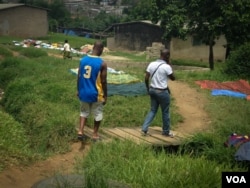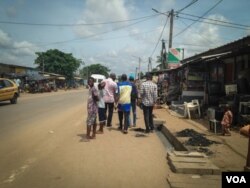In Ivory Coast, the government is trying to reach out to gangs of youths terrorizing parts of the commercial capital, Abidjan, as fed-up residents have started taking matters into their own hands.
The mere mention of the so-called “microbes” stirs fear and anger.
“They are very dangerous elements,” said one woman. “A few days ago, they attacked an internet café, right there, at the intersection.” It’s dangerous to go out late, she says. By 10 or 11 p.m., they are everywhere.
“Microbes” is the French term for germs. But here in Abidjan, it refers to gangs of young men and boys, some only 10 years old, wreaking havoc on the streets. The gangs have been tied to numerous assaults, robberies and even murders.
The gangs started in a crowded, low-income part of Abidjan, called Abobo.
One resident said “we catch a kid and take him to the police and two days later we see him in out in the street again. There is no follow-up, no justice,” he said. “So next time we won’t take him to authorities, he will be lynched and that’s all.”
In April, an angry mob killed a 19-year-old microbe chief in the street in broad daylight, which in return triggered revenge attacks.
In some areas, residents have set up self-defense groups. Issa leads one of the groups.
He said “they were assaulting our parents, our mothers. They were very violent.” He said police had only one car patrolling the neighborhood and couldn’t protect us. “It was like we were in a cage and had lions attacking us. We had to defend ourselves,” he said.
Armed with machetes and sticks, the residents' group would patrol the streets at night and confront the gangs. Local businesses paid the vigilantes protection money.
But the violence only continued and lately, Issa said, they have switched their approach.
“We told ourselves we should try establish trust between us and these kids, try to listen to them and understand what brings them to do these things,” said Issa.
To find the microbes during the day, you have to take unpaved paths down a steep slope. And there, among the vegetation in a small flat area, some teenagers live, sleeping rough on the ground.
Most of them have parents and do go home now and again but they live mainly on the streets.
“I have nothing to eat at home. My dad doesn’t work, nor do my mom or my brothers. There is no work. I had to take care for myself,” said one of them.
Advocates working with the youth say older, more experienced criminals are taking advantage of the boys, enlisting them to do their dirty work.
Authorities regularly organize raids and arrest the microbes. But many get released quickly since they are minors.
The government is now trying outreach.
Leontine Zagba runs the program to protect vulnerable children at the Ministry of Women, Family and Child Protection.
“When you have no self-esteem, you have nothing to lose and will do anything,” he said. His program is working with them to bring that self-esteem back and show them that not all is lost.
Last year, a test project sent about 70 teenagers to a rehabilitation center to learn skills like mechanics, woodwork and sewing. But former microbes face stigma when they try to get work, said Satigui Koné, president of the NGO Fedoci, based in Abobo.
He said the government should think about creating jobs and industry here since people are scared of people from Abobo. It’s one of the solutions worth exploring, he said.
No one knows exactly how many microbes there are. The best estimates are several hundred. But Koné said Ivory Coast cannot afford to underestimate the trouble they could cause.








